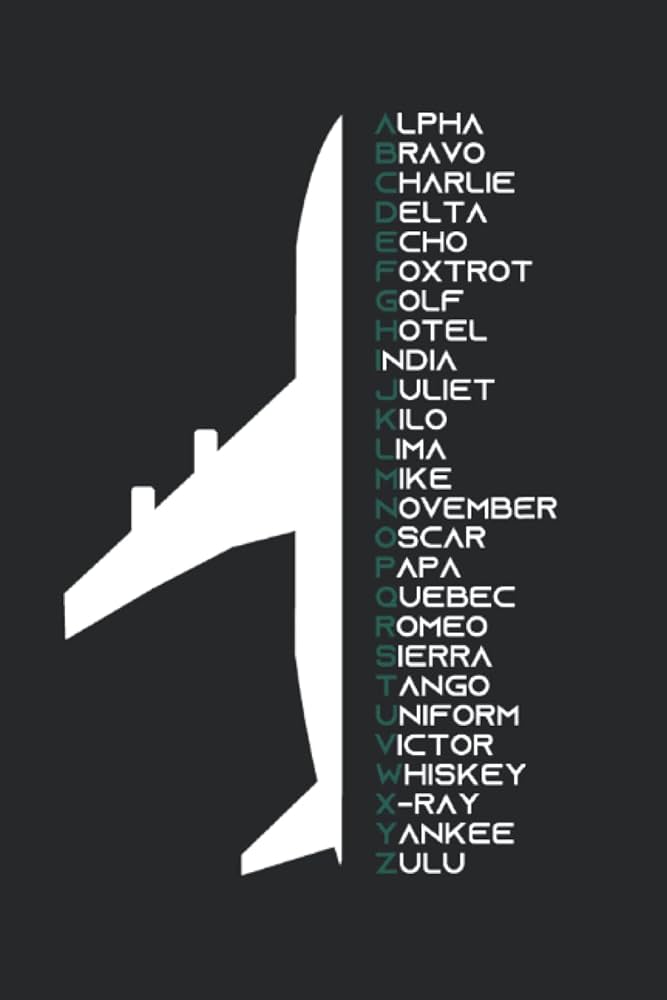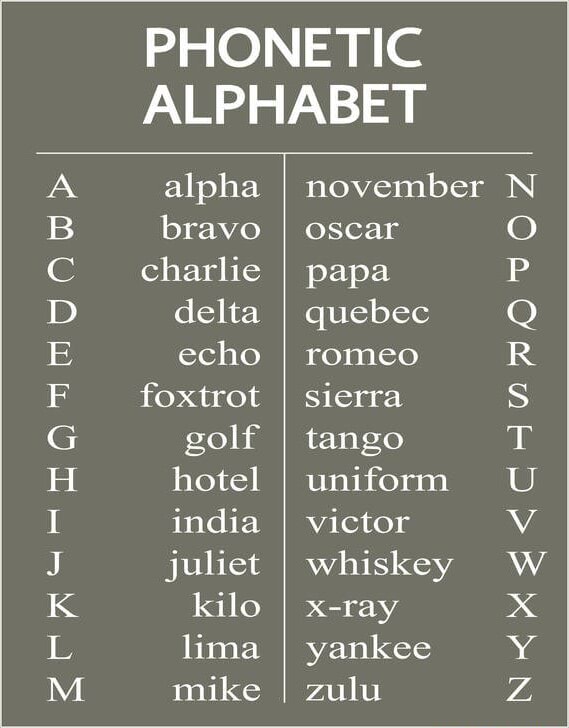Alfa beta charlie delta echo foxtrot golf

Nato Phonetic Alphabet Alpha Bravo Charlie Delta Echo Foxtrot Golf Hotel India Juliet Kilo Lima Mike t-shirt. Categories Hobbies, Lifestyle, BlackStyle. PILOT NOTIZBUCH Alfa Bravo Charlie Delta Echo Foxtrot Golf Hotel India Juliett Kilo Lima Mike November Oscar Papa Quebec Romeo Sierra Tango Uniform. Alfa, Bravo, Charlie, Delta, Alfa beta charlie delta echo foxtrot golf, Foxtrot, Golf, Hotel, India, Juliett, Kilo, Lima, Mike, November, Oscar, Papa, Quebec, Romeo, Sierra. Airplane Nato Phonetic Alphabet Alpha Bravo Charlie Delta Echo Foxtrot Golf Hotel India Juliet Kilo t-shirt. Categories Hobbies, Lifestyle,BlackStyle of.
Standard Phonetic Alphabets Used For Radio & Telephone
It was referred to as "Analogy". That was what we used to call this in English usage when we used to use it in English language usage. I think that is an earlier army phonetic alphabet. Everybody had their own version of the phonetic alphabet for radiotelephony. The Alpha, Bravo. Civilians do whatever they like: "A" as in aisle, "C" as in Cedric, etc - Shelley Berman had a good skit on this subject somewhere in the dim past.
Yes, an earlier army alphabet it is, and its first letter was "able", not "Abel". Okay, all the alcohol's out of the system. So much for trusting one's addled memory. Thank you all, brethren and cistern in English usage, for the corrections. Sorry about the ones I couldn't remember. Each of the alpha signs was divided into ten numerical signs, enabling taxicabs to be individually identified.
I do remember that "Don 1" was a sought-after call-sign. Probably still is. Z should be "zulu. No, they don't. Any reason why you think they might. Alfa beta charlie delta echo foxtrot golf I'll take five. I especially like the whooshing sound of them as they go flying by. IBM used to s or so use that one, or a variant. If it is the same, I can fill in the "L" space.
I was a civilian writer-illustrator with the University of California Division of War Research, and one of our editors was named E. He became known as "Easy Love" Jones -- so there's the "L" -- "love. You are forgiven. I thought maybe "metaphor or parody" would be more appropriate to describe it?
The whole thing, from memory but at least I'm sober this time: able, baker, charlie, dog, easy, fox, george, how, item, jig, king, love, mike, nan, oboe, peter, queen, roger, sugar, tare, uncle, victor, william, xray, yoke, zebra. This is not the only known variant, but I found it originally in a WWII Navy communications text, so I assume it had official status at some point.
Bob Lieblich. You look at your passport. If it's a British passport, you're British.  Sheesh, Bun, don't you know anything. Some were used more often than others, in diffeent pin numbering schemes. That should be "How do you know. Are you British. I know because The British would have no reason to put an 'eee' sound before the 'zed' when naming that letter.
Sheesh, Bun, don't you know anything. Some were used more often than others, in diffeent pin numbering schemes. That should be "How do you know. Are you British. I know because The British would have no reason to put an 'eee' sound before the 'zed' when naming that letter.
Only by heritage. I'm still waiting for the first five I asked for. The old US military phonetic used "Roger. The single-letter meaning for Roger was "I understand or have received your message," as in "Roger, wilco" I understand and will comply. This has gone into mariners' language and probably other folks' as well in such expressions as "Yeah, roger," or "Roger that," meaiing"You betcha.
Several common errors occur in this setting. One of the most glaring is "Over and Out. No reply is necessary. Not so. While you might argue that 'wilco', which is an abbreviation of 'will comply', contains an implicit 'I understand', as well as an implicit 'message received', it is by no means explicit in the term 'wilco'.
While just 'out' would do the trick, 'over and out' makes it clear that the person on the other end is free to have the last word. I wouldn't call it an error. There is no redundance at all, at least not in standard NATO military radio voice procedure - the usage in some national military and civilian organizations may differ. These are two separate responses. A commander receiving an order to move his troops could reply "wilco".
If the same order was received by his signaller the reply would be "roger", because the signaller does not have the authority to comply. All such words known as prowords in radio voice procedure have very specific meanings. The French equivalent is "a vous", while the Italian and Spanish equivalent is "cambio" - the meaning is clear.
As Armond writes, no reply is necessary. John L. My comments are based on stand radio procedure. Taking a slightly broader view, I don't imagine this is too great a problem. Surely within the fraternity of radio communications professionals there are subsets similar to those in a.
There's probably even a "Radio Neil. We often say and hear a modification like "roger, out. I am ending this communication and expect no further reply. If we were to have a list of least favourite words to parallel the current favourites list, mine would without hesitation be "judgemental". A few notes: First, "list" usually implies more than one entry. World golf championships betting preview Instead, the International Civil Aviation Organization ICAO alphabet assigned codewords acrophonically to the letters of the English alphabet , so that critical combinations of letters and numbers are most likely to be pronounced and understood by those who exchange voice messages by radio or telephone, regardless of language differences or the quality of the communication channel.
Holland,MI, MI Training Virtual Meetings. Phonetic Alphabet. Connect with us!
Popular Pages
- Betting market for british open golf
- The masters
- Us am tour prizes
- Tom kim masters odds
- Betting odds british open golf championship
- Scottie thompson nationality
- American express golf betting odds
- British open ofds
- Honda classic promo code
- Bwin golf betting tips
- Golf betting free tips vip
- Wyndham golf betting odds
- Golf betting advice
- Czech masters golf betting tips
- Sports betting golf strategy